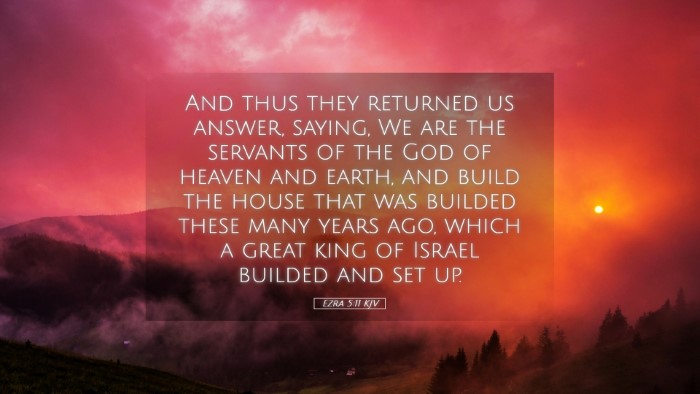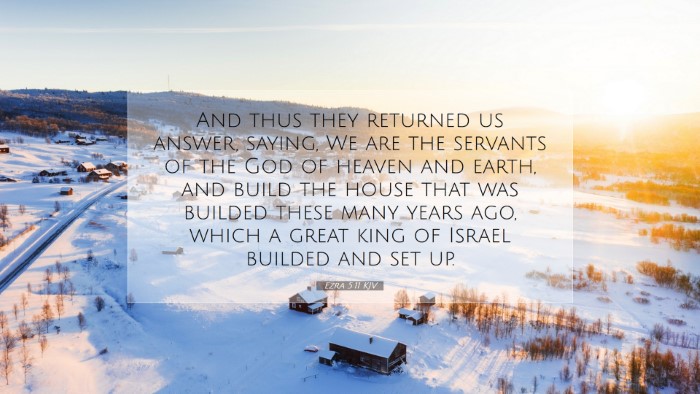Old Testament
Genesis Exodus Leviticus Numbers Deuteronomy Joshua Judges Ruth 1 Samuel 2 Samuel 1 Kings 2 Kings 1 Chronicles 2 Chronicles Ezra Nehemiah Esther Job Psalms Proverbs Ecclesiastes Song of Solomon Isaiah Jeremiah Lamentations Ezekiel Daniel Hosea Joel Amos Obadiah Jonah Micah Nahum Habakkuk Zephaniah Haggai Zechariah MalachiEzra 5:11
Ezra 5:11 KJV
And thus they returned us answer, saying, We are the servants of the God of heaven and earth, and build the house that was builded these many years ago, which a great king of Israel builded and set up.
Ezra 5:11 Bible Commentary
Commentary on Ezra 5:11
Ezra 5:11 states: "And this is the copy of the letter that they sent unto him, even unto Darius the king; Thy servants, the men on this side the river, and at such a time." This verse is crucial in understanding the context of the rebuilding of the Temple and the challenges faced by the Jews under Persian rule. Below, we explore the insights from various public domain commentaries.
Context of Ezra 5:11
The Book of Ezra details the return of the exiles from Babylon and their efforts to rebuild the Temple in Jerusalem. Ezra 5 falls within a narrative context that reveals the opposition faced by the Jewish people from their adversaries, notably in the form of letters to the Persian king.
Historical Background
Matthew Henry emphasizes the significance of this period: the remnant of Israel had returned to their ancestral land under the decree made by Cyrus. However, they faced local opposition which resulted in a temporary halt of their construction efforts.
The Resistance to Rebuilding
Albert Barnes notes that this verse comes after the adversaries of the Jews had written to King Darius, challenging the legitimacy of their building activities. This section serves to exhibit the conflict between God's people and the surrounding nations who wished to undermine their efforts.
Key Themes and Lessons
- The Authority of the Government: The letter to Darius highlights the important role of political authority. Adam Clarke points out that the structural organization of governance in the Persian Empire played a significant part in the lives of the Jews, demonstrating how divine providence intersects with secular power.
- The Power of Communication: The written communication to Darius reveals the strategic use of letters to assert their rights. Matthew Henry suggests that this serves as a model for believers today on the importance of appealing to authorities when pursuing divine endeavors.
- Endurance in Opposition: The context of Ezra 5:11 illustrates the perseverance required amidst adversity. Albert Barnes reflects on how the Jewish exiles remained steadfast in their mission despite the threats and challenges posed by outsiders.
Theological Implications
Adam Clarke brings to light the spiritual dimension of this struggle. The rebuilding of the Temple symbolizes a restoration of worship and community with God. The opposition faced serves as a reminder of the spiritual battles that often accompany efforts to draw closer to God.
Faith and Confidence
In light of Ezra 5:11, the faith of the Jews can be observed through their actions. They continued their work in the face of opposition, showcasing a reliance on God’s greater plan. Matthew Henry posits that their faithfulness is something that modern believers can aspire to, especially during trying times.
Prayerful Dependence
Both Barnes and Clarke underscore the need for prayerful dependence on God for guidance and sustenance in the face of trials. This is especially relevant for pastors and leaders who may find themselves contending with resistance either from outside their congregations or within.
Practical Applications for Today
As we reflect on Ezra 5:11 and its surrounding context, several practical applications emerge:
- Engage in open communication with both spiritual and secular leaders about initiatives that promote God’s work.
- Encourage congregations to remain steadfast in their faith despite external challenges and discouragements.
- Promote prayer as a primary response to any form of opposition, supporting each other in faith and community.
In conclusion, Ezra 5:11 is not just a historical reference but a vivid illustration of the ongoing conflict between faith and worldly powers. The insights provided by Matthew Henry, Albert Barnes, and Adam Clarke encourage modern readers to understand the significance of resilience, the importance of communication with governing authorities, and the ultimate reliance on God throughout the challenges of life.


